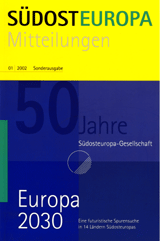Turkey
Turkey
Author(s): Murat BelgeSubject(s): Politics / Political Sciences
Published by: Südosteuropa Gesellschaft e.V.
Keywords: Cold War; Soviet socialism; Balkans; Tukey; PKK; Cyprus and the EU;
Summary/Abstract: The last decade of the twentieth century proved to be a rough time for most parts of Central and Southeastern Europe. The Yugoslav Federal Republic got dismembered in a most explosive and painful manner, while Czechs and Slovaks made a peaceful divorce. The countries that were not immediately affected by these events nevertheless felt the reverberations and/or immersed themselves in their own domestic problems. Turkey, the southern-most and eastern-most country of Southeast Europe, seemed to be the one affected least by these storms coming from the European continent at that ti me. She aIso had her hands full with her own ethnicity problems. The disturbances in Southeast Europe were, of course, triggered by a series of events starting with the fall of the Berlin Wall, the rapid changes of regimes in eastern European socialist countries, the collapse of the Soviet regime in the Soviet Union, culminating in the end of the Cold War. Unlike the other countries in the region, Turkey, together with Greece, did not have to undergo the traumas of transition from Soviet socialism to market capitalism; it was seriously affected, however, by the political implications of the end of the Cold War. Now, as the turmoil on the Balkan Peninsula is beginning to subside, we can see that this event, which has brought a lot of happiness all over the world, has injured Turkey in probably even a permanent way.
Journal: Südosteuropa Mitteilungen
- Issue Year: 2002
- Issue No: 01
- Page Range: 120-131
- Page Count: 12
- Language: English
- Content File-PDF

